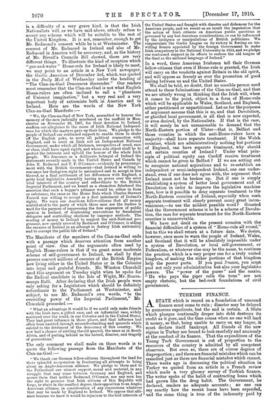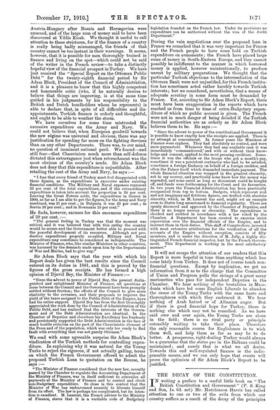TURKISH FINANCE.
ASTATE which is reared on a foundation of unsound finance must come to ruin ; disaster may be delayed by numerous expedients, but the end is certain. A State which plunges continually deeper into debt destroys its credit as it goes, and the time comes when no one will lend. it money, so that, being unable to carry on any longer, it must declare itself bankrupt. All friends of the new regime in Turkey are bound to look carefully and anxiously at the conduct of its finance. That the expenditure of the Young Turk Government is out of proportion to the resources of the country is admitted by all competent observers. But even so, there are of course degrees of disproportion ; and there are financial mistakes which can be remedied just as there are financial mistakes which cannot. Three weeks ago in discussing the political situation in Turkey we quoted from an article in a French review which made a very gloomy survey of Turkish finance. The writer spoke of the habit of contracting loans which had grown like the drug habit. The Government, he declared, renders no adequate accounts ; no one can say exactly how the recent loans have been expended, and the same thing is true of the indemnity paid by Austria-Hungary after Bosnia and Herzegovina were annexed, and of the large sum of money said to have been discovered at Yildiz Kiosk. We thought it useful to call attention to these strictures, for if the finance of a country is really being badly mismanaged, the friends of that country cannot be too instant in their warnings. It seems, however, that it is possible for men thoroughly trained in finance and. living on the spot—which could not be said of the writer in the French review—to take a distinctly hopeful view of the financial prospect in Turkey. We have just received the "Special Report on the Ottoman Public Debt" for the twenty-eighth financial period. by Sir Adam Block, President of the Council of Administration, and. it is a pleasure to know that this highly competent and honourable critic (who, if he naturally desires to believe that things are improving, is at the same time guided in his judgments by his responsibility to the British and Dutch bondholders whom he represents) is able to declare that, in spite of all difficulties and dis- appointments, Turkish finance is orderly and thoughtful, and ought to be able to weather the storm.
We have ourselves for some time mistrusted the excessive expenditure on the Army and. Navy. We could not believe that, when European goodwill towards the new regime was universal and obvious, there was any justification for spending far more on the fighting Services than on any other Departments. There was, to our mind, no question of imminent national peril. We feared—and still fear—that Chauvinism much more than self-defence dictated. this extravagance just when retrenchment was the most obvious of the country's needs. Sir Adam Block does not deny that this expenditure is unjustifiable. After retailing the cost of the Army and Navy, be says :— "I fear that every friend of Turkey must feel disappointed with these figures, as the expenditure is excessive under existing financial conditions. The Military and Naval expenses represent 33 per cent. of the total expenditure, and if the extraordinary expenditure is taken into account the proportion is 39 per cent. Leaving the Great Powers aside, the expenditure in Greece in 1909, as far as I am able to get the figures, for the Army and Navy combined, was 21 per cent. ; in Bulgaria it was 23 per cent. ; in Servia 26 per cent.; and in Roumania 13 per cent."
He finds, however, excuses for this enormous expenditure of 39 per cent. :— " The general feeling in Turkey was that the moment was critical, and it was believed that with this outlay the country would be secure and the Government better able to proceed with the peaceful development of its resources. Although not pro- ductive expenditure properly so-called, Military and Naval expenditure may sometimes be considered as indispensable. The Minister of Finance, who, like similar Ministers in other countries, was harassed by the demands made upon him by the Departments of War and Marine, had to give way."
Sir Adam Block says that the year with which his Report deals has given the best results since the Council entered on its duties in 1881, and this is proved. by the figures of the gross receipts. He has formed a high opinion of Djavid Bey, the Minister of Finance :— "Since the advent to power of Djavid Bey, the present distin- guished and enlightened Minister of Finance, all questions at issue between the Council and the Government have been promptly settled without friction; the efforts of the Council to give more elasticity to the revenues, and their proposals to improve the yield of the taxes assigned to the Public Debt of the Empire, have had his entire support. Djavid Bey has from the first thoroughly appreciated the work done by the Council of Administration of the Public Debt, and has realised that the interests of the Govern- ment and of the Debt Administration are identical. In the Chamber of Deputies and elsewhere his Excellency has fearlessly and persistently supported the Debt Administration in the face of much hostile criticism on the part of the Chauvinistic element of the Press and of the population, which was only too ready to find fault with everything that was not purely Ottoman."
We read with some agreeable surprise Sir Adam Block's vindication of the Turkish methods for controlling expen- diture. In explaining why it was natural for the Young Turks to reject the rigorous, if not actually galling, terms on which the French Government offered. to admit the proposed Turkish Loan to quotation on the Bourse, he says :— "The Minister of Finance considered that the new law, recently passed by the Chamber to regulate the Accounting Department of the Ministry of Finance, was in itself sufficient to centralise all payments at the'Ministry of Finance and to control and cheek non-Budgetary expenditure. So close is this control that the Minister of War has endeavoured recently to liberate himself from its effect. The law is perhaps too complicated, but its inten- tion is excellent. M. Laurent, the French adviser to the Ministry of Finance, states that it is a veritable code of Budgetary
legislation founded on the French law. Under its provisions no expenditure can be authorised without the visa of the Audit Department."
During the vain negotiations over the proposed loan in France we remarked that it was very important for France and the French people to have some hold on Turkish expenditure on armaments ; the French have placed. large sums of money in South-Eastern Europe, and they cannot possibly be indifferent to the manner in which borrowed money is applied, however unintentionally, to produce unrest by military preparations. We thought that the particular Turkish objections to the intermediation of the Ottoman Bank were not unjustified, for this French institu- tion has sometimes acted rather harshly towards Turkish interests ; but we considered, nevertheless, that a means of adequate scrutiny in some form must be demanded by France. Yet, according to Sir Adam Block's Report, there must have been exaggeration in the reports which have reached us from time to time of extra-Budgetary expen- diture of which no public account is given. The French were not in much danger of being deluded if the Turkish financial authorities are as orderly as Sir Adam Block believes them to be. He says :— " Since the advent to power of the constitutional Government it is possible to know exactly how the receipts are applied. There is no attempt at concealment. In former years the Ministers of Finance were cyphers. They had absolutely no control, and were mere paymasters. Whenever they had any available cash it was immediately 'commandeered,' and with or without their know- ledge and consent, applied to the most pressing creditors. Some- times it was the officials or the troops who got a month's pay, sometimes it was a persistent contractor who had to be satisfied, sometimes a foreign Embassy on behalf of a foreign creditor, and often the Palace itself which demanded immediate payment. The whole financial situation was wrapped in the greatest obscurity, not to say secrecy, and practically none knew how the money was expended, and none cared as long as discontent could be bought off, and funds were forthcoming for the Court and its favourites. In two years the Financial Administration has been practically reorganised from top to bottom. Budgets, which represent real and not imaginary and fictitious figures, are drafted with absolute sincerity, which, as M. Laurent has said, might set an example even to States long accustomed to financial regularity. These are openly discussed and approved by the Chamber of Deputies, and there is no longer secrecy or obscurity. The expenditure is checked and audited in accordance with a law voted by the Chamber. A Department has been created to exercise strict supervision over the financial officials of the Empire, and to instruct them in their duties. This staff of Comptrollers, invested with most extensive attributions for the verification of all the accounts of the Empire without exception, consists of fifty members, and is under the direction of M. Jolly, a highly dis- tinguished French financial inspector, lent by the French Govern- ment. This Department is working in the most satisfactory manner."
It will not escape the attention of our readers that this Report is more hopeful in tone than anything which has come lately from Turkey. It does not of course touch non- financial questions. Except by implication, we get no information from it as to the charge that the Committee of Union and Progress pulls the strings of a great many marionettes who pass for independent Deputies in the Chamber. We hear nothing of the brutalities in Mace- donia which have led some English Liberals to abandon the cause of the Young Turks with the same haste and thoroughness with which they embraced it. We hear nothing of Arab hatred or of Albanian anger. But if there is good financial hope for Turkey, there is nothing else which may not be remedied. As we have said over and over again, the Young Turks are alone in the field ; there is no rival party or principle ostensibly waiting to take their place. Therefore the only reasonable course for Englishmen is to wish them well, and help them as far as may be to do better. A prosperous, right-dealing Turkey would always be a guarantee that the status quo in the Balkans could be maintained ; and surely that is what we all desire. Towards this end well-regulated finance is the indis- pensable means, and we can only hope that events will prove the optimism of Sir Adam Block's Report to be justified.























































 Previous page
Previous page